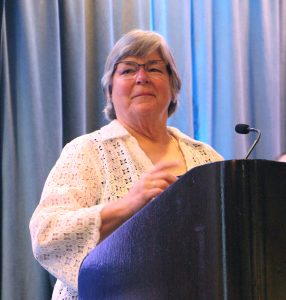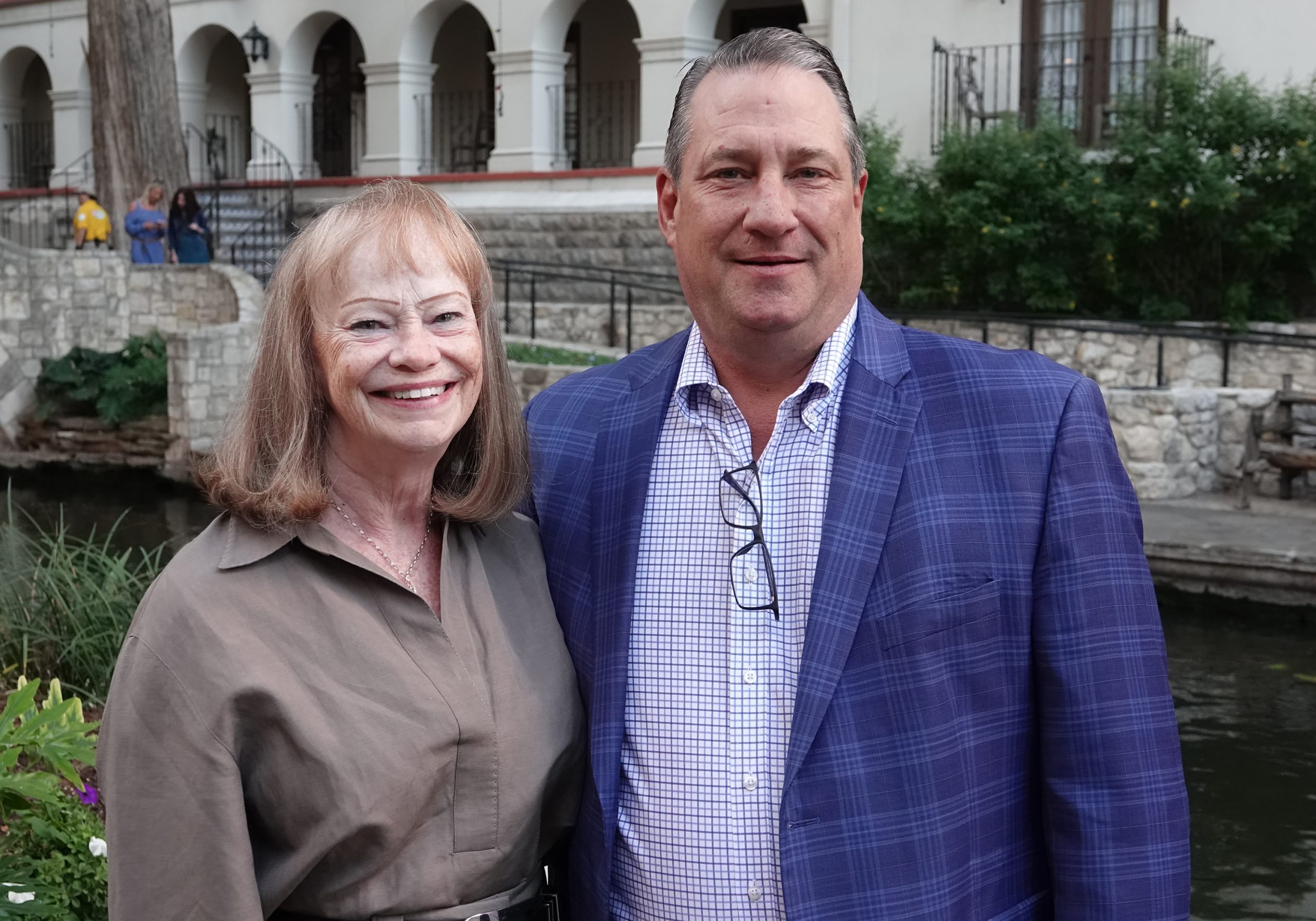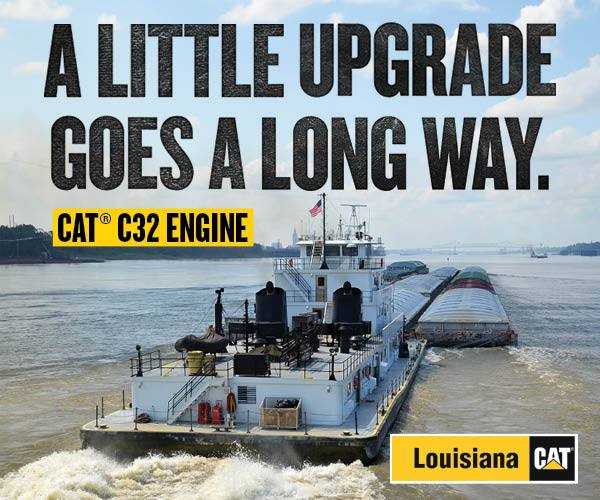Waterways Council Inc. (WCI), a Washington D.C.-based maritime industry advocacy group, held its 21st annual Waterways Symposium in San Antonio, Texas, November 13–14.
WCI’s board of directors and members met November 13 to discuss policy and strategy for the upcoming presidential administration and congressional session, while also installing a new board chairman. Jeff Webb, president of Cargill Marine & Terminal, succeeded Cherrie Felder, vice president of Channel Shipyard, as chairman of WCI’s board of directors.
Eddie Belk, director of civil works for the U.S. Army Corps of Engineers, offered a look at funding for the Corps’ civil works projects, as well as the timeline for projects already in the pipeline.
Belk offered a little context to Corps funding from Congress over the last 10 or 12 years, particularly as it relates to earmarks or, as they are called now, “congressionally directed spending.” During the earmark ban, funding in 2011, 2012 and 2013, for instance, was pretty flat.
“About two years later, they said, ‘Well, this sucks,’ so they figured that out, and we started getting work plan funding beginning in 2014,” Belk said. “Right now, our earmarks are back, and, if you look at what Congress is doing in ’22 for our appropriations for the things that we do for you, [it was] about $602 million in earmarks. That’s doubled since then. We’re now at $1.4 [billion], almost $1.5 billion, so Congress is again taking back the power of the purse, and that helps as you make your way around the Hill.”
Belk also touched on two emergency operations that have been in the news this year: the allision and collapse of the Francis Scott Key bridge in Baltimore, Maryland, and the low water on the Mississippi River and tributaries. Regarding the emergency work to clear the wrecked bridge and reopen the ship channel in Baltimore, Belk said he’s optimistic the Corps will be able to recoup some of the money spent on that operation. With regard to low water, Belk said communication was key to keeping commerce moving.
“The partnership between the Corps and industry has really been the secret sauce to make this go,” he said. “You’re the eyes and ears. You’re giving us what you see on the river. We’re able to use that to make adjustments on where we dredge and what our priorities are, so it’s been a decisive element.”
Touching on new construction, Belk said the Corps’ goal is to deliver projects, from the start of design to finish, in eight years.
“That is not the journey we’ve been on at Kentucky and [Chickamauga] and some others, but that’s the journey we’re trying to move to, and so there are lots of things we’re going to have to do to make that come true,” he said.
Once Kentucky, Chickamauga and the Lower Monongahela projects are “off the books,” Belk said, “Then we can start applying some of the resources that you’ve managed to get and some of the policy relief that you’ve been able to get and apply those to the next set of priorities.”
Other priorities Belk mentioned included modernizing and standardizing controls at Corps structures, particularly to protect them from cyber threats, and employing composite materials to shield against corrosion. Belk also said the Corps is looking at enhancing efficiencies through the use of artificial intelligence and by moving lock and dam design to the U.S. Army Engineer Research and Development Center (ERDC).
At several points during the Waterways Symposium, attendees brought up President-elect Donald Trump’s new department of government efficiency (DOGE). Belk said the Corps will have a better sense of that once a new secretary of the Army is confirmed and a civil works appointee is in place. He said he feels confident about the Corps’ navigation mission.
“I really don’t see waterways losing or shifting in that environment,” he said. “I just think it’ll be elevated because of the economic value of waterways and the investments we’re making. I just don’t see that taking a step back.
“I could be wrong,” Belk added, “but I don’t see that in the Trump administration, and I think Elon [Musk] probably has bigger fish he could fry.”
With the symposium falling just after the November election, geopolitics and what to expect from the next administration were both repeated topics of discussion. Ken Eriksen, managing member and strategic adviser at Polaris Analytics and Consulting, looked at the economic outlook for the barge industry, with a close look at the barge fleet, and Kristin Meira with American Cruise Lines (ACL), a WCI member company, discussed the company’s business model and growth projections.
Manthey Award

A special segment of the symposium took place late in the morning when Kurt Strand, president and CEO of the National Mississippi River Museum & Aquarium, Tommy Lange, vice president of finance and operations for the museum, and Jeremy Putman, president of Riverview Boat Store and Tug Service, presented the National Rivers Hall of Fame Achievement Award to Capt. Joy Manthey, a trailblazer for women on the inland waterways who also helped launch a chaplain ministry to inland mariners. Today, Manthey works as a mate pilot aboard American Cruise Lines vessels.
Always a teacher, Manthey said one of the things she loves most about working aboard ACL vessels is introducing the vessel staff, particularly the marine crew members, to the possibilities within the wider maritime industry.
“I’ve promised all these young people that if they finish their 6-month contract, and they’ve got to finish the 6-month contract, I’ll be happy to help them get a job on a towboat or on a passenger boat in their back yard,” Manthey said, later adding, “We have these young people, and hopefully we’ll get them out in the industry, and we’ll continue to get more people in the industry, which is my main goal.”
————
Featured photo caption: Cherrie Felder, vice president of Channel Shipyard and immediate past chairman of the board of directors of Waterways Council Inc., stands along the riverwalk in San Antonio, Texas, with Jeff Webb, president of Cargill Marine &Terminal and the current WCI board chairman.




